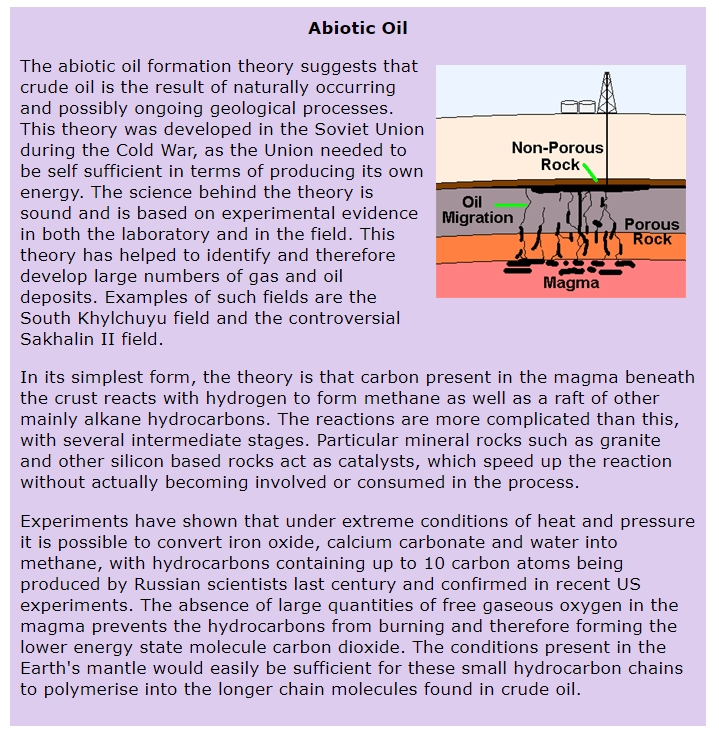Post by Ethan / JRyan on Mar 24, 2019 21:13:49 GMT -5
In short, oil reproduces through a process near the mantle/crust deep within the Earth. I have been following it for a while and remain interested but not convinced. I think it time to add a post here about this as well. I will post links to get you started on this theory, Russian to begin with I think. In some ways it makes ALOT of sense. Keep in mind what was said when hydrocarbons were found on a moon of Saturn.

Titan's Surface Organics Surpass Oil Reserves on Earth

Abiogenic petroleum origin
Richard Heinberg on Abiotic Oil
Abiotic Oil
Fossils From Animals And Plants Are Not Necessary For Crude Oil And Natural Gas, Swedish Researchers Find

Forget What You’ve Heard: Oil and Gas Are Actually "Renewable" Resources

Titan's Surface Organics Surpass Oil Reserves on Earth

Abiogenic petroleum origin
Abiogenic petroleum origin is a term used to describe a number of different hypotheses which propose that petroleum and natural gas deposits are mostly formed by inorganic means rather than by the decomposition of organisms. Thomas Gold's deep gas hypothesis states that the origin of some natural gas deposits were formed out of hydrocarbons deep in the earth's mantle. Theories explaining the origin of petroleum as abiotic, however, generally not well accepted by the scientific community. [1][why?]
Earlier studies of mantle-derived rocks from many places have shown that hydrocarbons from the mantle region can be found widely around the globe. However, the content of such hydrocarbons is in low concentration.[2] While there may be large deposits of abiotic hydrocarbons, globally significant amounts of abiotic hydrocarbons are deemed unlikely.[3]
Earlier studies of mantle-derived rocks from many places have shown that hydrocarbons from the mantle region can be found widely around the globe. However, the content of such hydrocarbons is in low concentration.[2] While there may be large deposits of abiotic hydrocarbons, globally significant amounts of abiotic hydrocarbons are deemed unlikely.[3]
Within the mantle, carbon may exist as hydrocarbons—chiefly methane—and as elemental carbon, carbon dioxide, and carbonates.[18] The abiotic hypothesis is that the full suite of hydrocarbons found in petroleum can either be generated in the mantle by abiogenic processes,[18] or by biological processing of those abiogenic hydrocarbons, and that the source-hydrocarbons of abiogenic origin can migrate out of the mantle into the crust until they escape to the surface or are trapped by impermeable strata, forming petroleum reservoirs.
Abiogenic hypotheses generally reject the supposition that certain molecules found within petroleum, known as biomarkers, are indicative of the biological origin of petroleum. They contend that these molecules mostly come from microbes feeding on petroleum in its upward migration through the crust, that some of them are found in meteorites, which have presumably never contacted living material, and that some can be generated abiogenically by plausible reactions in petroleum.[17]
Abiogenic hypotheses generally reject the supposition that certain molecules found within petroleum, known as biomarkers, are indicative of the biological origin of petroleum. They contend that these molecules mostly come from microbes feeding on petroleum in its upward migration through the crust, that some of them are found in meteorites, which have presumably never contacted living material, and that some can be generated abiogenically by plausible reactions in petroleum.[17]
Richard Heinberg on Abiotic Oil
The abiotic theory holds that there must therefore be nearly limitless pools of liquid primordial hydrocarbons at great depths on Earth, pools that slowly replenish the reservoirs that conventional oil drillers tap.
Meanwhile, however, the oil companies have used the biotic theory as the practical basis for their successful exploration efforts over the past few decades. If there are in fact vast untapped deep pools of hydrocarbons refilling the reservoirs that oil producers drill into, it appears to make little difference to actual production, as tens of thousands of oil and gas fields around the world are observed to deplete, and refilling (which is indeed very rarely observed) is not occurring at a commercially significant scale or rate except in one minor and controversial instance discussed below.
The abiotic theorists also hold that conventional drillers, constrained by an incorrect theory, ignore many sites where deep, primordial pools of oil accumulate; if only they would drill in the right places, they would discover much more oil than they are finding now. However, the tests of this claim are so far inconclusive: the best-documented “abiotic” test well was a commercial failure.
Meanwhile, however, the oil companies have used the biotic theory as the practical basis for their successful exploration efforts over the past few decades. If there are in fact vast untapped deep pools of hydrocarbons refilling the reservoirs that oil producers drill into, it appears to make little difference to actual production, as tens of thousands of oil and gas fields around the world are observed to deplete, and refilling (which is indeed very rarely observed) is not occurring at a commercially significant scale or rate except in one minor and controversial instance discussed below.
The abiotic theorists also hold that conventional drillers, constrained by an incorrect theory, ignore many sites where deep, primordial pools of oil accumulate; if only they would drill in the right places, they would discover much more oil than they are finding now. However, the tests of this claim are so far inconclusive: the best-documented “abiotic” test well was a commercial failure.
Abiotic Oil
The hypothesis of abiotic oil holds an interesting place in Earth sciences. Most geophysicists will agree that it is plausible for some amount of hydrocarbons to arise from natural processes. That plausibility exists within very limited bounds, because all of the oil we've found so far has been fossil fuel, metamorphosed from ancient organic biomass. We can tell this for a certainty because of the chemical signatures that come with it. When a primeval biome got buried and transformed into oil over millions of years, pure hydrocarbon fuel is not what was left over. It's full of the other chemical biomarkers that tell us whether that was a swamp full of plants and algae or an inland sea full of plankton and prehistoric megafauna. They broke down into the chemicals of life such as chlorophyll and hemoglobin, and left us biomarkers such as pristane, phytane, steranes, triterpanes and porphyrin, among many others. This is why there is no question that if abiogenesis does take place, it does so on a very small scale, small enough that we haven't found any of it yet. It is not a pseudoscience — so long as it's kept within known bounds. But most of the proponents of abiogenesis argue that it is responsible for all oil, or most oil, or that we have a limitless supply from the depths of the Earth, constantly regenerating itself. This perspective — distinct from the plausible version — is pure pseudoscience, as it's trivially disproven on a lab bench with a mass spectrometer and any sample of natural crude oil from anywhere in the world.
Fossils From Animals And Plants Are Not Necessary For Crude Oil And Natural Gas, Swedish Researchers Find

What would happen if it were proven that "fossil fuels" weren't the result of decaying plant and animal matter, were actually created within the Earth due to simple chemistry and you could not be scared into believing that we were "running out" of oil and natural gas?
Estimates of how much crude oil we have extracted from the planet vary wildly. As late as May of 2009 a report published in the International Journal of Oil, Gas and Coal Technology suggested that we may have used more than we think.
The idea that we are running out of oil is not a new one. Scientists have told us that oil is a limited resource which was formed millions of years ago by the decaying vegetation and biomass of extinct species of plants and animals. With an estimated 1- trillion barrels of oil already extracted from deep wells since commercial drilling began around 1870, many predict that we are nearing the mid-point of remaining oil on the planet.
But there have always been those who claim that oil is a natural substance that forms automatically in the Earth's mantle. They say that it is virtually everywhere, if you can drill deep enough to tap it.
Estimates of how much crude oil we have extracted from the planet vary wildly. As late as May of 2009 a report published in the International Journal of Oil, Gas and Coal Technology suggested that we may have used more than we think.
The idea that we are running out of oil is not a new one. Scientists have told us that oil is a limited resource which was formed millions of years ago by the decaying vegetation and biomass of extinct species of plants and animals. With an estimated 1- trillion barrels of oil already extracted from deep wells since commercial drilling began around 1870, many predict that we are nearing the mid-point of remaining oil on the planet.
But there have always been those who claim that oil is a natural substance that forms automatically in the Earth's mantle. They say that it is virtually everywhere, if you can drill deep enough to tap it.
Forget What You’ve Heard: Oil and Gas Are Actually "Renewable" Resources
We've been taught that fossil fuels, like oil and natural gas, formed hundreds of millions of years ago. Prehistoric animals that once roamed the earth died. From the buried remains of these animals as well as plants, a natural decomposition process took place that required eons of time, intense heat, and a lot of pressure. This prehistoric process formed the fuels we now use today to run our modern economy.
Given that it took millions of years to fill the earth up with oil and gas, there has always been a concern over how fast we are consuming these resources. This is what sparked the Peak Oil Theory, which states that with a finite resource like oil it will at some point hit its production peak and then it will be all downhill from there. That's unless of course oil and gas are not finite resources, but instead turn out to actually be more renewable than we thought.
Given that it took millions of years to fill the earth up with oil and gas, there has always been a concern over how fast we are consuming these resources. This is what sparked the Peak Oil Theory, which states that with a finite resource like oil it will at some point hit its production peak and then it will be all downhill from there. That's unless of course oil and gas are not finite resources, but instead turn out to actually be more renewable than we thought.

